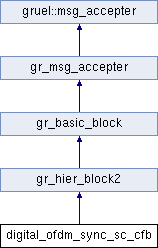digital_ofdm_sync_sc_cfb Class Reference
Schmidl & Cox synchronisation for OFDM. More...
#include <digital_ofdm_sync_sc_cfb.h>

Public Member Functions | |
| ~digital_ofdm_sync_sc_cfb () | |
Friends | |
| DIGITAL_API digital_ofdm_sync_sc_cfb_sptr | digital_make_ofdm_sync_sc_cfb (int fft_len, int cp_len, bool use_even_carriers) |
Detailed Description
Schmidl & Cox synchronisation for OFDM.
Input: complex samples. Output 0: Fine frequency offset, scaled by the OFDM symbol duration. This is  in [1]. The normalized frequency offset is then 2.0*output0/fft_len. Output 1: Beginning of the first OFDM symbol after the first (doubled) OFDM symbol. The beginning is marked with a 1 (it's 0 everywhere else).
in [1]. The normalized frequency offset is then 2.0*output0/fft_len. Output 1: Beginning of the first OFDM symbol after the first (doubled) OFDM symbol. The beginning is marked with a 1 (it's 0 everywhere else).
The evaluation of the coarse frequency offset is *not* done in this block. Also, the initial equalizer taps are not calculated here.
Note that we use a different normalization factor in the timing metric than the authors do in their original work[1]. If the timing metric (8) is
![\[ M(d) = \frac{|P(d)|^2}{(R(d))^2}, \]](form_6.png)
we calculate the normalization as
![\[ R(d) = \frac{1}{2} \sum_{k=0}^{N-1} |r_{k+d}|^2, \]](form_7.png)
i.e., we estimate the energy from *both* half-symbols. This avoids spurious detects at the end of a burst, when the energy level suddenly drops.
[1] Schmidl, T.M. and Cox, D.C., "Robust frequency and timing synchronization for OFDM", Communications, IEEE Transactions on, 1997.
Constructor & Destructor Documentation
| digital_ofdm_sync_sc_cfb::~digital_ofdm_sync_sc_cfb | ( | ) |
Friends And Related Function Documentation
| DIGITAL_API digital_ofdm_sync_sc_cfb_sptr digital_make_ofdm_sync_sc_cfb | ( | int | fft_len, |
| int | cp_len, | ||
| bool | use_even_carriers | ||
| ) | [friend] |
- Parameters:
-
fft_len FFT length cp_len Length of the guard interval (cyclic prefix) in samples use_even_carriers If true, the carriers in the sync preamble are occupied such that the even carriers are used (0, 2, 4, ...). If you use all carriers, that would include the DC carrier, so be careful.
The documentation for this class was generated from the following file:
